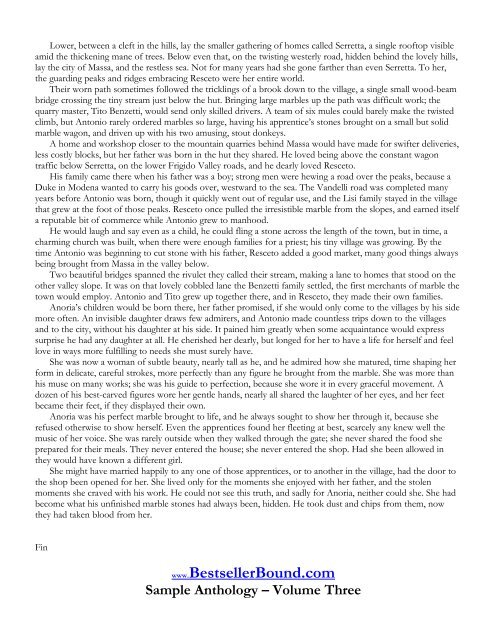Volume Three - WordPress.com — Get a Free Blog Here
Volume Three - WordPress.com — Get a Free Blog Here
Volume Three - WordPress.com — Get a Free Blog Here
Create successful ePaper yourself
Turn your PDF publications into a flip-book with our unique Google optimized e-Paper software.
Lower, between a cleft in the hills, lay the smaller gathering of homes called Serretta, a single rooftop visible<br />
amid the thickening mane of trees. Below even that, on the twisting westerly road, hidden behind the lovely hills,<br />
lay the city of Massa, and the restless sea. Not for many years had she gone farther than even Serretta. To her,<br />
the guarding peaks and ridges embracing Resceto were her entire world.<br />
Their worn path sometimes followed the tricklings of a brook down to the village, a single small wood-beam<br />
bridge crossing the tiny stream just below the hut. Bringing large marbles up the path was difficult work; the<br />
quarry master, Tito Benzetti, would send only skilled drivers. A team of six mules could barely make the twisted<br />
climb, but Antonio rarely ordered marbles so large, having his apprentice’s stones brought on a small but solid<br />
marble wagon, and driven up with his two amusing, stout donkeys.<br />
A home and workshop closer to the mountain quarries behind Massa would have made for swifter deliveries,<br />
less costly blocks, but her father was born in the hut they shared. He loved being above the constant wagon<br />
traffic below Serretta, on the lower Frigido Valley roads, and he dearly loved Resceto.<br />
His family came there when his father was a boy; strong men were hewing a road over the peaks, because a<br />
Duke in Modena wanted to carry his goods over, westward to the sea. The Vandelli road was <strong>com</strong>pleted many<br />
years before Antonio was born, though it quickly went out of regular use, and the Lisi family stayed in the village<br />
that grew at the foot of those peaks. Resceto once pulled the irresistible marble from the slopes, and earned itself<br />
a reputable bit of <strong>com</strong>merce while Antonio grew to manhood.<br />
He would laugh and say even as a child, he could fling a stone across the length of the town, but in time, a<br />
charming church was built, when there were enough families for a priest; his tiny village was growing. By the<br />
time Antonio was beginning to cut stone with his father, Resceto added a good market, many good things always<br />
being brought from Massa in the valley below.<br />
Two beautiful bridges spanned the rivulet they called their stream, making a lane to homes that stood on the<br />
other valley slope. It was on that lovely cobbled lane the Benzetti family settled, the first merchants of marble the<br />
town would employ. Antonio and Tito grew up together there, and in Resceto, they made their own families.<br />
Anoria’s children would be born there, her father promised, if she would only <strong>com</strong>e to the villages by his side<br />
more often. An invisible daughter draws few admirers, and Antonio made countless trips down to the villages<br />
and to the city, without his daughter at his side. It pained him greatly when some acquaintance would express<br />
surprise he had any daughter at all. He cherished her dearly, but longed for her to have a life for herself and feel<br />
love in ways more fulfilling to needs she must surely have.<br />
She was now a woman of subtle beauty, nearly tall as he, and he admired how she matured, time shaping her<br />
form in delicate, careful strokes, more perfectly than any figure he brought from the marble. She was more than<br />
his muse on many works; she was his guide to perfection, because she wore it in every graceful movement. A<br />
dozen of his best-carved figures wore her gentle hands, nearly all shared the laughter of her eyes, and her feet<br />
became their feet, if they displayed their own.<br />
Anoria was his perfect marble brought to life, and he always sought to show her through it, because she<br />
refused otherwise to show herself. Even the apprentices found her fleeting at best, scarcely any knew well the<br />
music of her voice. She was rarely outside when they walked through the gate; she never shared the food she<br />
prepared for their meals. They never entered the house; she never entered the shop. Had she been allowed in<br />
they would have known a different girl.<br />
She might have married happily to any one of those apprentices, or to another in the village, had the door to<br />
the shop been opened for her. She lived only for the moments she enjoyed with her father, and the stolen<br />
moments she craved with his work. He could not see this truth, and sadly for Anoria, neither could she. She had<br />
be<strong>com</strong>e what his unfinished marble stones had always been, hidden. He took dust and chips from them, now<br />
they had taken blood from her.<br />
Fin<br />
www.<br />
BestsellerBound.<strong>com</strong><br />
Sample Anthology – <strong>Volume</strong> <strong>Three</strong>







